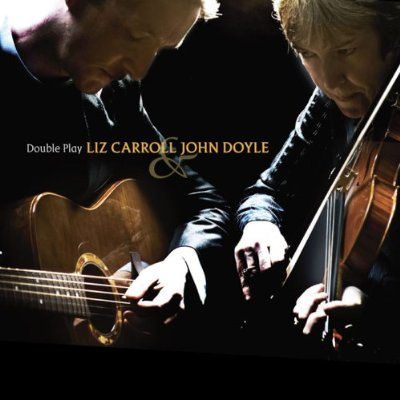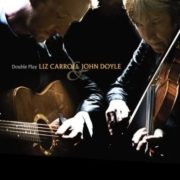LIZ CARROLL AND JOHN DOYLE – DOUBLE PLAY
Artist: Liz Carroll and John Doyle
Title: Double Play
Label: Compass Records
Release Date: 2009

Double Play is the second album from Liz Carroll and John Doyle as duo. Following their first duo effort, In Play (2005), Double Play is work of outstanding musicianship, arguably the best traditional Celtic CD of the year.
Liz Carroll occupies an interesting position among contemporary Irish fiddlers. Unlike, Kevin Burke or Martin Hayes, most of the tunes she plays, on this CD and others, are generally not traditional tunes from the public domain, but rather her own compositions. She’s a prolific tunemaster. This, in and of itself, is not unusual; fiddlers in many of the Celtic traditions (Scottish, Cape Breton, Shetland, as well as Irish) compose new tunes regularly, and some of these new tunes become session favorites that get played alongside tunes that go back centuries. New tunes keep the tradition fresh. In many cases, though, new tunes give themselves away as new, the “tell” being some modern, cosmopolitan element. But Liz’s new tunes always fool me — they have the simple, direct charm of tunes that have come down through generations. In particular, Liz has a knack for writing interesting, appealing slow tunes — slow tunes that don’t sound like dirges. Lament of the First Generation was a stand-out tune from her 2000 CD Lost in the Loop. On the new CD, Lament for Tommy Makem and Nearby, Long Ago are cut from similar cloth — beautiful, bittersweet melodies that evoke a complex mixture of emotions.
John Doyle has contributed his signature style of back-up guitar to several of Liz’s earlier albums (Lake Effect, Lost in the Loop). His heavy damping of the strings produces a light and nimble percussive effect, with complex basslines subtly present, always in service to the melody. There’s lots of this terrific back-up guitar on Double Play. But there are also a number of tracks where the guitar (and bouzouki and mandola as well) breaks out of the back-up role, taking the melody and interacting with the fiddle in lively and creative ways. It’s not traditional instrumentation for Irish music — fretted instruments are relatively recent imports to the Irish sound — yet the interplay captures the gently meandering style at the heart of the Irish tradition.
Double Play features three fine songs sung by John, whose father, Sean Doyle, is a well-known singer and collector of traditional songs. Down at the Wakehouse is a nice happy traditional song of love, which segues beautifully into Liz’s composition The True Love of My Heart. Two other two songs, A Pound A Week Rise and The Hare’s Lament, tell much sadder tales from the point of view of the powerless and downtrodden — in one case, coal miners hoping for higher wages in exchange for their dangerous and miserable work, in the other, a hare listening as hunters and hounds approach her den. Neither tale has a happy ending.
One of my favorite tracks is the set of two often-played session tunes, Castle Kelly and Galway Rambler. Liz tunes her fiddle here to “cross A” (lower two string tuned up so that the standard GDAE becomes AEAE.) This tuning is used a lot in American old-time music, but is more unusual in Irish fiddling. Cross-tuning allows the fiddler to play chords and easily switch octaves, opening up new avenues into which Liz takes off with driving energy.
Most of the tracks are sets of tunes of two or more tunes, reels and jigs that will bring a smile to your face and a tap to your toe. The sets are nicely put together, with tunes that complement each other in interesting ways. The transitions are quite effective, shaping your reactions both to what came before and what comes after.
Double Play is collaborative playing at its best, displaying the intensity and melodic focus of solo playing, as well as the drive and synergy of a band. Liz Carroll and John Doyle are among the very finest contemporary Irish musicians, and they clearly love the music the play. You will too.
Kathy Bawn is a mom, raising Obin and Anya; a political science professor, teaching at UCLA; a musician, playing banjo and guitar with little talent but great enthusiasm; and a fan of traditional music of all kinds.













